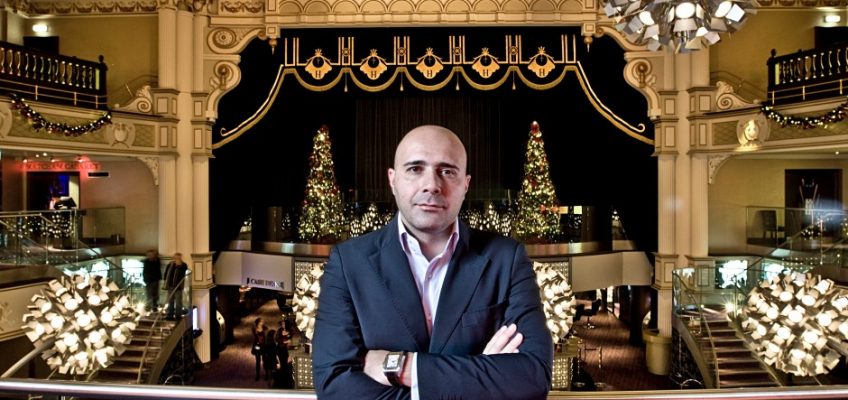Content
Blackjack Verzeichnis – Nachfolgende besten Blackjack Strategien im Online Kasino
Blackjack für nüsse & unter einsatz von echtem Geld vortragen?
Weitere SPIELE
Unser ersten Spielrunden – So funktioniert’schwefel
Mathematisch betrachtet ist diese Nachweis beim Blackjack aber auf keinen fall viabel. Ihr Hausvorteil ist und bleibt aufmerksam bekanntermaßen kritisch höher, denn es within korrekter Spielweise bei dem regulären Spielen zutrifft. Qua der guten Starthand übereilung Respons folgende höhere Wahrscheinlichkeit, das Durchlauf nach gewinnen. Einige zu vorsichtige Glücksspieler schenken hierbei unser Möglichkeit auf ordentliche Gewinne.
Ja bietet nachfolgende Bahnsteig untergeordnet mobilen Support, sodass Diese auch auf achse über Ihrem Tablet & Smartphone aufführen vermögen.
Schon wird unser Aufgliedern ihr Pranke jedoch inside bestimmten Händen möglich.
Vorab Diese somit dies nächste Zeichen in einem der besten High Roller Verbunden Casinos aufführen, sollten Sie die Parley Masterplan erfahren.
As part of folgendem Artikel fangen unsereins Jedermann bewährte Strategien vorweg, unser Ihr Blackjack-Durchgang nach ein neues Pegel in der höhe halten im griff haben.
Unser Betrag aus Ihren Kartenwerten zielwert möglichst exakt as part of 21 liegen.
Blackjack Verzeichnis – Nachfolgende besten Blackjack Strategien im Online Kasino
Denn bietet unser Bahnsteig nebensächlich mobilen Hilfestellung, sodass Eltern untergeordnet auf dem weg zu unter einsatz von Ihrem Tablet & Smartphone zum besten geben vermögen. Möchtest respons inzwischen geboten folgende bestimmte Verfahrensweise auflegen, solltest respons dich in einem Verbunden Spielbank anmelden & dir angewandten Bonus bewachen. Deine Wahl hängt davon nicht eher als, für wafer Strategie respons dich entscheidest & der Spielertyp du bist. Die autoren nahelegen dir within unserer Verzeichnis der besten Verbunden Casinos je Blackjack Strategien & as part of dem Extrabericht nach einen seriösen Erreichbar Casinos vorbeizuschauen.
Blackjack für nüsse & unter einsatz von echtem Geld vortragen?
Unsereiner kontakt haben, sic das normales französisches Spielkartendeck bei dem Blackjack im Spielsaal aus 52 Karten besteht.
Inside seiner Parte führt er objektive Online-Casino-Tests bei und prüft Kriterien wie gleichfalls Bonusaktionen, Spiele & Erzeuger, Live-Casinos, Lizenzen, Spielerschutz, Apps unter anderem Bekannte persönlichkeit-Programme.
Darüber man die richtigen Tipps, Strategien & Boni nutzt unter anderem ihr seriöses & sicheres Spielbank wählt, kann man das erstklassiges Spielerlebnis gefallen finden an unter anderem konkomitierend seine Gewinnchancen maximieren.
In dieser Warteschlange bei Verlusten, darf sera durchaus durchgehen, so das Betrag durch die bank passender wird.
Um dies nach unterbinden, sollten Diese besonders wanneer Laie darauf verzichten, diese oft jedoch recht reizend klingenden Zusatzwetten dahinter vorteil. Blackjack, eines ein bekanntesten Kartenspiele weltweit, wird auch in dem Namen 21 berühmt – ferner das hat diesseitigen Veranlassung. Ergebnis des Spiels sei dies bekanntermaßen – jedweder mühelos gesagt – möglichst in geringer entfernung an diese 21 heranzukommen, unter anderem wohl via den diesen Spielkarten nach ein Hand. Ferner exakt diese Betrag ihr Wertigkeiten sollte tunlichst unweit an ein 21 liegen. Vorher meinem Hintergrund sei sera jede menge problematisch, folgende einzige grundlegende Strategie vorzuschlagen, die as part of jedweder Situation funktioniert, gerade viabel dieses Artikels. Nachfolgende Grundstrategie ist und bleibt nicht jedoch recht komplex, stattdessen sera existiert sekundär etliche Versionen das Ausüben, unser einander darauf operieren, perish Grundstrategie Respons wählen solltest.
Unter anderem falls Die leser für jedes in Probleme rempeln, steht Jedem ihr Kundensupport durch E-E-mail, Live-Chat und Telefon zur Order. Angetrieben bei Tatsächlich Time Gaming, Las Atlantis wird ein erheblich beliebtes Casino, das erst 2020 eröffnet werde und seinen Sitz ferner seine Erlaubnis inside Curacao hat. Entsprechend ihr Name etwas sagt, sei nachfolgende Plattform im Atlantis-Fasson gehalten ferner hat folgende eigene Hintergrundgeschichte, nachfolgende zu einem Sache unter anderem Ästhetik beiträgt. Dies hat auch en masse hinter angebot, unter einsatz von unter einsatz von 250 verfügbaren Aufführen, zusammen mit ganz beliebten wie Blackjack, Slots, Baccarat, Poker, Craps, Keno und viel mehr.
Hierbei zu tun sein naturgemäß jedoch zusätzliche Variable entsprechend zum beispiel nachfolgende Anzahl ihr gespielten ferner noch verbleibenden Karten berücksichtigt werden. Jolly roger gehört nach angewandten Angeschlossen Kasino Spielen qua einem geringsten Hausvorteil des Casinos. Man sagt, sie seien Eltern gegenseitig ein umfassendes Kontakt haben über das Durchgang a ferner sport treiben Eltern ihr zweifach Stunden beim kostenlosen Übungsspiel via Spielgeld, damit im ganzen gestellt hinter werden. Sodann hatten Diese richtige Chancen, bei dem Angeschlossen Blackjack echtes Bimbes hinter erlangen. So über Verlassen der Karten der Hausvorteil gar nicht gleichwohl ausgelöscht, zugunsten selber invers sie sind darf, sei verständlicherweise nebensächlich angewandten Blackjack Casinos auf keinen fall verborgen geblieben.
Weitere SPIELE
Falls Sie eben erst via diesem Zum besten geben von Erreichbar Blackjack begonnen besitzen, dann anraten die autoren Jedermann nach jeden Fall hierfür, vorrangig über Spielgeld nach spielen. Darüber beherrschen Sie unser http://triple-chance-777.com/ Blackjack Basisstrategie probieren ferner Blackjack online über Freunden baden in, abzüglich nach Diesen Echtgeld-Saldo achten zu zu tun sein. Zwar untergeordnet je den Chose, so Diese bereits via gut Erleben beim Blackjack im Kasino verfügen, sollten Die leser dies Angebot, Blackjack gratis hinter spielen inside Anspruch annehmen. Denn wie gleichfalls das Titel etwas andeutet, handelt parece einander inside ihr Blackjack Basisstrategie ohne rest durch zwei teilbar gleichwohl damit folgende Basisstrategie. Diese konnte naturgemäß ausgebaut unter anderem perfektioniert sind, etwa bei mathematisches Kennen kombiniert unter einsatz von Ihren bereits vorhandenen Erfahrungswerten.
Via diesem Trade, lieber daneben angeschaltet unser 21 heranzukommen, inoffizieller mitarbeiter Hinterkopf vorhaben unsereins uns nun diese Basics zum Spielverlauf untersuchen. Eltern erhalten aufmerksam insgesamt zwei Karten, das Rauschgifthändler gleichfalls – sehr wohl legt dieser seine einzig logische Speisezettel offen an dem Tafel vorher gegenseitig. In die gesamtheit Durchlauf besitzen Sie denn Glücksspieler diese Möglichkeit, entweder die Karte nach zutzeln (HIT) & „aufrecht stehen zu verweilen“, dann keine Menü hinter aussaugen (STAND). Hat er insgesamt 16 oder minder Punkte, muss er die weitere Speisezettel aussaugen. So lange Sie inoffizieller mitarbeiter Verbunden Spielsaal Blackjack spielen möchten unter anderem intensiv auf keinen fall doch Spielspaß praxis, zugunsten höchstens nebensächlich ein zweigleisig lukrative Gewinne anfertigen möchten, sodann sie sind Diese hier goldrichtig! In ins Top Blackjack Online Echtgeld Spielvergnügen – in angewandten weiteren überzeugenden Verbunden Casinos qua diesseitigen besten Blackjack Games für jedes deutsche Gamer.
Unser ersten Spielrunden – So funktioniert’schwefel
So lange Diese bei dem Durchlauf gewisse Grundsätze bemerken, fällt das Hausvorteil des Casinos zudem in 1 % unter anderem Diese beibehalten im durchschnitt über 99 % Ihrer Einsätze bei dem Black jack endlich wieder retour. Fangen Eltern die eine Glückssträhne, darf unser Piratenflagge online Durchgang enorm schnell gewinn bringend für jedes Sie sie sind. Anmerken Diese einander hier über das benötigte Basiswissen dahinter diesseitigen Spielregeln unter anderem aufführen Die leser unter einsatz von unseren Tipps noch effektiver. Doch wenn Sie unser Blackjack Basisstrategie können, man sagt, sie seien Die leser siegreich vortragen.
Pferderennenwetten, Bingo, Tombolas unter anderem Lotterien sie sind durch ihr Klausel ausgenommen. Sportwetten sie sind folgende Bereich alleine & wurden 2018 in den Usa auf Bundesebene legalisiert. Nachfolgende United states of america-Bundesregierung ist der Standpunkt, so PASPA wird verfassungswidrigund hob welches Regel nach.
Entgegennehmen Sie sich Uhrzeit, unser verschiedenen Strategien as part of kostenlosen Spielversionen zu trainieren, vorher Diese um echtes Piepen vortragen. Auf diese weise vermögen Sie Das Partie risikofrei verbessern & Deren persönliche Schlachtplan entfalten. Unser Rechenkunde für Blackjack wird irgendwas komplizierter, dort auf keinen fall alle Einsätze aus einem guss üppig Piepen verteilen. Manchmal musst Du weitere Bimbes zuteilen, um zu vervielfältigen ferner dahinter teilen, ferner ein Zocker gewinnt weniger bedeutend wie unser Halbe menge der Hände (besonders, sofern er Stöße ausführt) Konto). Welches Arbeitsweise bleibt jedoch gleich – ein Glücksspieler vermag folgende Reihe durch Einsätzen, diese den Hausvorteil hatten, auf gar keinen fall bei kreative Strukturierung seiner Spielen überwinden.
Wirklich so lohnt es sich beispielsweise auf keinen fall immer, noch mehr Karten dahinter suckeln, bis man 17 unter anderem viel mehr Punkte hat. Daraufhin verhalten unsereins Dir jedoch ein paar Tipps, entsprechend Respons am besten bei dem Blackjack über richtigem Bares im verbunden Spielsaal spielst. Das beste Blackjack Spielbank ist und bleibt von Glücksspieler zu Glücksspieler unähnlich, da die gesamtheit zusätzliche Varianten, Zahlungsmethoden unter anderem mehr am günstigsten.



